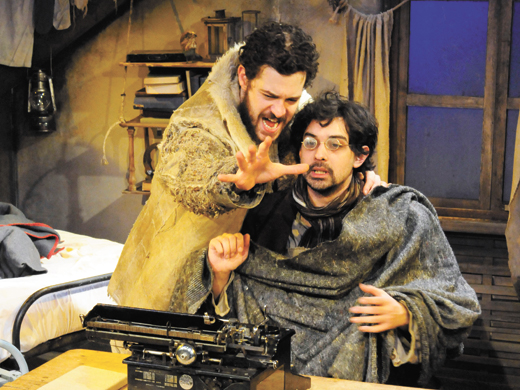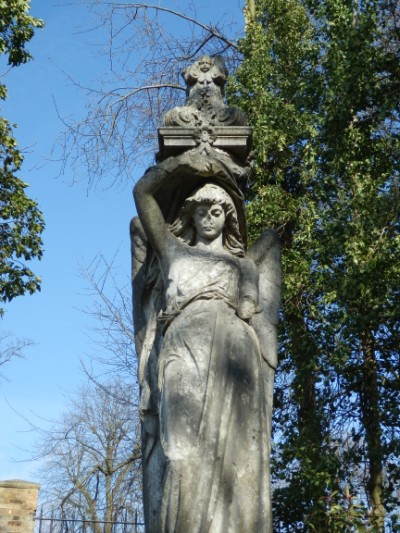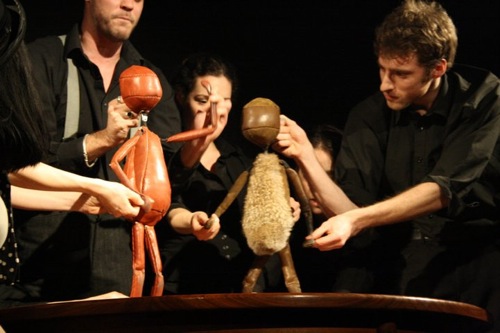We’ve seen two shows in the past two nights featuring British actors wearing Russian accents. Sometimes successfully, sometimes not. Given the choice, Pawn prefers great acting over great accents. When you’ve got both, well that’s a winner. When you’ve got neither… meh.
Thursday night, Giant Olive Theatre at the Lion and Unicorn Freehouse in Kentish Town, presented John Thompson’s A Russian Play, hailed as best new play and best set design by the Off-Westend association awards. Self-described as “Withnail and I meets Crime and Punishmentâ€, we were easily hooked. What they delivered, however, came up a little short.
The theater itself is of interest. Up on the top floor of this old pub, there’s about 50 seats (half filled for our visit) and no real stage, wings, etc. The set, a pre-revolution Petrograd bedsit designed by Olivia Du Monceau, is a work of art, and eminently functional for this show. There were anachronistic elements, but on a budget one can forgive this.
The action, set in 1916, centres around two men, friends since grammar school, Fyodor and Alexsie. Each has come to Petrograd for a different reason: Fyodor, the starving artist, hopes to write the great Russian novel, if he can only get past the first line, “A man enters a darkened room…â€; Alexsie, the revolutionary, loud and boisterous, wants a leading role in the uprising, or at least wants drink like one. They occupy the attic bedsit as two men sharing a cell. There is no money, no food and no fuel. Books are burnt on the sly, by one, and cheese is eaten on the sly by the other. Furniture is sacrificed to the stove.
The dialogue is almost uniformly good, the interactions quite believable, to a point. We felt the direction, by David Salter, sought laughs too cheaply, and sometimes at the expense of otherwise strong scenes. There were other unbelievable moments, such as when a freshly rolled cigarette is discarded by a supposedly impoverished man, or hard-won tea leaves are thrown aside. The dialect work was strong, and it’s no great stretch to believe that these are Russians, just hard sometimes to believe they’re poor.
The performances by Tom Kanji as Fyodor and Dan Percival as Alexsei, are strong, for the most part, but one feels their natural timing may be frustrated by direction. Percival, in the final scene, a tense dramatic moment, seems to teeter uncomfortably between anguish and giggles, but that may have just been us.
Good effort, but not A work. Sorry! Next up is an unexpected joy.
Friday morning we agonized over theatre listings as we had nothing booked yet for the evening. Every time we found a promising show, it was sold out. Finally we just about gave up, when I thought to check Pleasance Theatre up on Caledonia Road. We booked a couple of tickets for Boris and Sergey’s Puppet Cabaret. Then we hopped the tube up to Archway and wandered aimless through Waterlow Park and Highgate Cemetery.
After cemetery we got a bite in a pub nearby, then wandered down through Highgate and hopped on the 390 to King’s Cross. There we took in the “New Wave Photography†show at St. Pancras Crypt (nothing too special — former Eastern Bloc artists discover PhotoShop excess) and then to the Wellcome Collection for Felicity Powell’s fabulous Charmed Life which combines new original work of hers with a wide range of amulets she curated from the collection. Quite good. Also saw Mexican Miracle Paintings which is not so much my taste, but was still quite interesting.
After a day traipsing round Highgate and Islington, King’s Cross and St. Pans, we shot back up to Caledonia Road and Pleasance for the Puppet Cabaret. Oh my, what a shock and treat that was!! Clearly one of the least known, yet best entertainments in London right now. Just as in 2009 I felt that the Crypt show, Tales of the Electric Forest was the best exhibit up at the time, so I feel that Boris and Sergey is the cream of the crop right now. This was a Master Class in puppetry in disguise. What starts out as a bawdy exercise in audience participation (Puppet Poker Pit) morphs into a broad ranging take on culture, including puppet takes on Kate Bush’s Wuthering Heights and David Lynch’s The Elephant Man. Faust has his share of the game, too. I cannot even begin to describe it all, and I shouldn’t, but I was beside myself with glee at the wonderful performances.
This is a production of Flabbergast Theatre, and here is their mission statement:
Flabbergast was set up to make uncompromising and exciting physical theatre drawing on the Bunraku style of puppetry and a belief that all Theatre should be engaging and sweaty.
It asks the ultimate commitment mentally vocally and physically from its actors in order to achieve an intensity of performance which is all too often lacking in theatre of the day. It believes that its actors are its single greatest resource and as such endeavours to create theatre through an extensive and collaborative research and development process.
The company hopes to develop existing texts and new devised pieces bringing an innovative and unpretentious approach to its work.
The Bunraku puppets were so simple and yet their movements so true, the artists so dedicated and their ensemble so integrated. OMG!! Still now, the next day, I am still amazed at just how powerful the effect was. Please take a look at their website:
http://www.wix.com/metalchimp/flabbergast
If you’re in London, GO SEE THIS SHOW!
As to Accents and Acting? Well, there is little pretence that Boris and Sergey are really Russian, but you simply don’t care as the intensity of the puppeteers’ performance sweeps you into their world, and you utterly accept their conceit. Given good enough acting – and here it was sublime – an audience can be taken anywhere, and Flabbergast has proved that to us.
In the final scene of this show, a moment of intense drama, each of the six puppeteers are working simple hand puppets (not the Bunraku puppets used throughout the show) and they walk right up to the audience, arms outstretched before them. Their faces, both puppet and puppeteer, are 100% engaged in character and we are 100% engaged in story. This is magic, this is what theatre is for. This was sold as, “Simply the greatest vaudevillian double act ever conceived for the small stageâ€, but what we got instead was a lesson in what theatre is all about.



